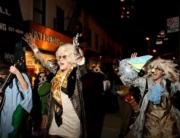“If it’s a struggle to live, you better fucking know what you’re struggling for,” proclaims Regina Nicholson after another grueling round of surgeries and chemo. What drives her to continue the losing battle against an invasive, aggressive cancer? How much pain and suffering is worth the month here, the few days there in which she gets to pretend to be a normal, healthy person again?
We meet Regina, then 17, as she discusses what she wants done after her death, her opposition to chemotherapy, and her wish to leave the country and try an experimental drug that has shown promise. She is with filmmaker Henry Corra, who has agreed to help her document what she has left of her life. Regina has spent so much time watching movies since her diagnosis that she has come to view film as the most challenging form of art. Adopting it as her preferred method of self-expression, filmmaking has become a means of escape for her.
Regina, living in Long Beach, CA, and still in the care of her parents and dependent on her father’s health insurance, is persuaded to submit to chemo treatments. Observing the physical toll it takes is almost too much to bear, and the strain on her parents is obvious. Her mother, in particular, begins to break down emotionally.
Her initial agreement with Regina’s wishes to make this documentary becomes a point of contention as the constant intrusion of the cameras begins to wear on her already frayed nerves. She becomes jealous of the time and attention that Regina devotes to Henry. Family time turns into a battleground with both parents taking turns playing good cop/bad cop in an effort to retain control over Regina’s life. Particularly poignant footage recorded on Christmas Day finds Regina retching into a plastic bucket as mother and father argue heatedly over the dose of her medications, with a scene from Rudolph the Red-Nosed Reindeer clearly audible in the background.
The candid footage is interspersed with cleverly chosen scenes from some of Regina’s favorite movies that, at times, provide a counterpoint to the overall oppressive nature of the film, and the somber indie soundtrack reflects the quiet acceptance with which Regina faces her fate. The collaborative nature of the project is obvious in the considerable footage devoted to the growing, though not clearly defined, relationship between the older Henry and Regina. His presence in her life encouraging her pursuit of art and independence ultimately results in Regina’s estrangement from her parents, and runs the risk of muddying the overall intent and impact of the film for its viewers. Shortly after her 18th birthday, Regina moves into a small house in South Pasadena, appointing Henry as her health care guardian. Despite most of the next year being spent in and out of hospitals and in increasing pain, this is a precious time for her, surrounded by a strong support network of friends and caregivers.
With the unflinching honesty of this film, Regina leaves her mark. It became her purpose, her reason to keep up the struggle. Creative, thought provoking, and painful to watch, it stands as a fitting memorial to Regina’s short life.






Leave A Comment